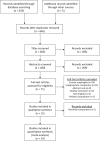Alginate therapy is effective treatment for GERD symptoms: a systematic review and meta-analysis
- PMID: 28375448
- PMCID: PMC6036656
- DOI: 10.1093/dote/dow020
Alginate therapy is effective treatment for GERD symptoms: a systematic review and meta-analysis
Abstract
In patients with gastroesophageal reflux disease (GERD) and erosive esophagitis, treatment with proton pump inhibitors (PPIs) is highly effective. However, in some patients, especially those with nonerosive reflux disease or atypical GERD symptoms, acid-suppressive therapy with PPIs is not as successful. Alginates are medications that work through an alternative mechanism by displacing the postprandial gastric acid pocket. This study performed a systematic review and meta-analysis to examine the benefit of alginate-containing compounds in the treatment of patients with symptoms of GERD. PubMed/MEDLINE, Embase, and the Cochrane library electronic databases were searched through October 2015 for randomized controlled trials comparing alginate-containing compounds to placebo, antacids, histamine-2 receptor antagonists (H2RAs), or PPIs for the treatment of GERD symptoms. Additional studies were identified through a bibliography review. Non-English studies and those with pediatric patients were excluded. Meta-analyses were performed using random-effect models to calculate odds ratios (OR). Heterogeneity between studies was estimated using the I2 statistic. Analyses were stratified by type of comparator. The search strategy yielded 665 studies and 15 (2.3%) met inclusion criteria. Fourteen were included in the meta-analysis (N = 2095 subjects). Alginate-based therapies increased the odds of resolution of GERD symptoms when compared to placebo or antacids (OR: 4.42; 95% CI 2.45-7.97) with a moderate degree of heterogeneity between studies (I2 = 71%, P = .001). Compared to PPIs or H2RAs, alginates appear less effective but the pooled estimate was not statistically significant (OR: 0.58; 95% CI 0.27-1.22). Alginates are more effective than placebo or antacids for treating GERD symptoms.
Keywords: alginate; gastroesophageal reflux disease; meta-analysis.
© International Society for Diseases of the Esophagus 2017. All rights reserved. For permissions, please e-mail: journals.permissions@oup.com.
Figures
References
-
- Hershcovici T, Fass R. Management of gastroesophageal reflux disease that does not respond well to proton pump inhibitors. Curr Opin Gastroenterol 2010; 26: 367–78. - PubMed
-
- Katz P O, Gerson L B, Vela M F. Guidelines for the diagnosis and management of gastroesophageal reflux disease. Am J Gastroenterol 2013; 108: 308–28; quiz 29. - PubMed
-
- Kahrilas P J, Shaheen N J, Vaezi M F. American Gastroenterological Association Medical Position Statement on the management of gastroesophageal reflux disease. Gastroenterology 2008; 135: 1383–91, 91 e1–5. - PubMed
-
- Fass R. Proton pump inhibitor failure–what are the therapeutic options? Am J Gastroenterol 2009; 104(Suppl 2): S33–8. - PubMed
Publication types
MeSH terms
Substances
Grants and funding
LinkOut - more resources
Full Text Sources
Other Literature Sources
Medical
Miscellaneous




